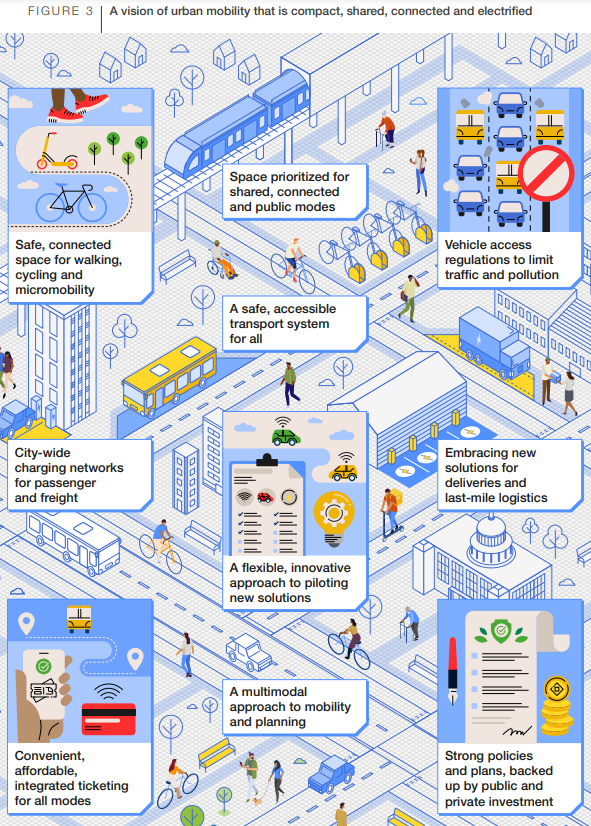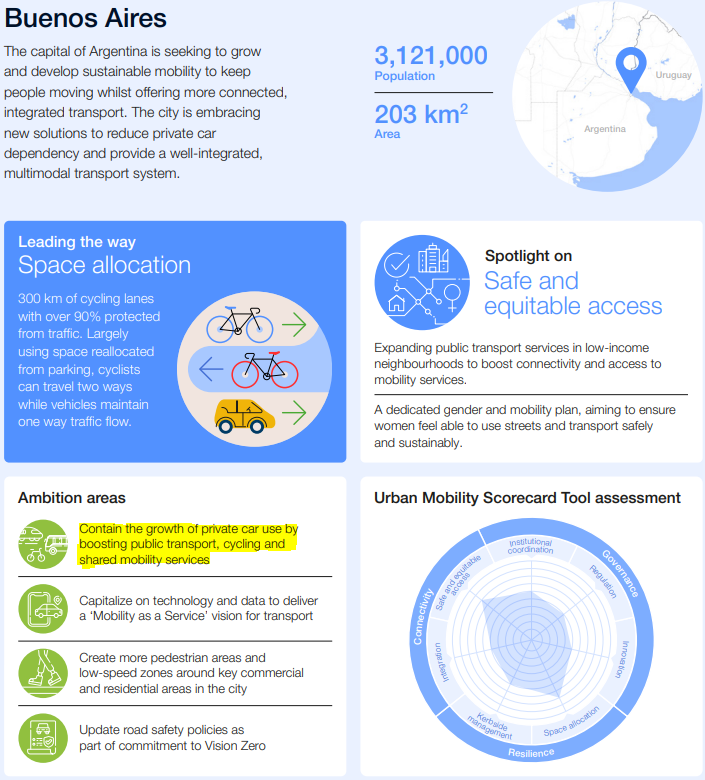WEF report gives further credence to the globalists’ ‘You’ll own nothing & be happy’ prediction: perspective
The World Economic Forum (WEF) is encouraging cities to contain the growth of private car use and to “reduce vehicles from a potential 2.1 billion to 0.5 billion” by 2050.
The unelected globalists at the WEF are looking to reduce private car ownership in urban areas by “adopting a shared, electric, connected and automated (SEAM) approach to urban mobility by 2050,” according to a new white paper.

“Contain the growth of private car use by boosting public transport, cycling and shared mobility services” — Ambition Area for Buenos Aires, Argentina; World Economic Forum white paper; May 2023
Published by the WEF in collaboration with Visa, “The Urban Mobility Scorecard Tool: Benchmarking the Transition to Sustainable Urban Mobility” white paper says that the challenge facing cities is “to shift towards a new model of urban mobility in which electrified, shared transport becomes the norm.”
According to the authors, the key to this shift “lies in the synergy between electrification, increasing the use of shared transport (such as public transport, shared vehicles and micromobility) and creating more compact cities.”
For example, the paper says that “compact cities also offer an opportunity to revitalize urban areas, creating more economically viable communities by enhancing local services and encouraging mixed-use districts.”

Recently, the WEF, through its Global New Mobility Coalition, trialed its Urban Mobility Scorecard Tool, which “seeks to bridge the gap between real-world challenges facing private-sector mobility players and the policy agenda set out by cities.”
Three cities were chosen for the trial: Buenos Aires, Argentina; Curridabat, Costa Rica; and Singapore.
“Contain the growth of private car use” was listed as the top ambition area for Buenos Aires.

The city-state of Singapore, according to the WEF, “is supporting the transition to shared and decarbonized mobility by expanding its network so that 80% of households are within 10 minutes of public transit.”
For Curridabat, a 2.4 square mile suburb of San Jose, the whiter paper vaguely states, “The city is embracing innovative approaches, such as nature-based solutions in urban planning, as well as advancing action on active mobility and public transport,” which includes plans for a “shared use street prioritizing walking and cycling, embedded with nature-based solutions by 2025.”
“Welcome to the year 2030. Welcome to my city – or should I say, ‘our city.’ I don’t own anything. I don’t own a car” — WEF Young Global Leader Ida Auken, ‘Welcome To 2030: I Own Nothing, Have No Privacy And Life Has Never Been Better,’ 2016
The Urban Mobility Scorecard Tool white paper gives further credence to the WEF’s prediction that by 2030 “You’ll own nothing. And you’ll be happy.”
It is a phrase that former WEF managing director Adrian Monck claimed “started life as a screenshot, culled from the internet by an anonymous anti-Semitic account,” even though it originated, verbatim, from a video (below) on the WEF Agenda blog post, “8 predictions for the world in 2030,” which was published in 2016 and taken down in 2023.
In reality, “You’ll own nothing. And you’ll be happy” was inspired by an essay written by Danish MP and WEF Young Global Leader Ida Auken entitled “Welcome To 2030: I Own Nothing, Have No Privacy And Life Has Never Been Better.”
In her essay, Auken envisioned a future that parts of the latest WEF white paper set out to accomplish:
“Welcome to the year 2030. Welcome to my city – or should I say, ‘our city.’ I don’t own anything. I don’t own a car […]
“When clean energy became free, things started to move quickly. Transportation dropped dramatically in price.
“It made no sense for us to own cars anymore […] We started transporting ourselves in a much more organized and coordinated way when public transport became easier, quicker and more convenient than the car.
“Now I can hardly believe that we accepted congestion and traffic jams, not to mention the air pollution from combustion engines.”
Currently, there are about 1.45 billion cars in the world, according to carsMetric, and the WEF and partners wish to see only 500 million cars across all cities by 2050.
The unelected globalists at the WEF applaud urban efforts to “reduce private car dependency” and “contain the growth of private car use” while pushing to eliminate combustion engines in favor of electric vehicles — just as the “You’ll own nothing. And You’ll be happy” essay predicted.
Image by pikisuperstar on Freepik











